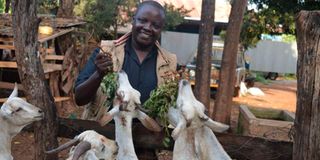Fr Eliud Mwenda: To teach farmers new crop varieties and practices, come to church

Father Eliud Mwenda, the priest incharge of Mukothima Holy Family Parish of the Catholic Diocese of Meru feeding goats at his parish farm in Tharaka-Nithi County. Francis Mureithi | Nation Media Group
Fr Eliud Mwenda is the priest in-charge of Mukothima parish of the Catholic Church in Tharaka Nithi. On the church’s 182-acre farm, he grows a variety of crops and keeps various animals as he not only seeks to nourish his faithful spiritually but also nutritionally. He spoke to Francis Mureithi
What do you farm?
Fr Mwenda: I grow vegetables like spinach, sukuma wiki (collard greens) and cabbages, fruits like pawpaws and passion, beans, maize and groundnuts and keep cows, goats, sheep, pigs and chickens. You can say I have recreated the Garden of Eden here because one finds all the foods they need. On the livestock farm, I keep 2,000 improved Kienyeji chickens, 40 Galla goats, 30 Merino sheep, four dairy cows, and 10 pigs.
Where do you draw your inspiration?
Fr Mwenda: I hold a masters degree in business management and entrepreneurship from Tangaza University College, specialising in agribusiness. When I completed my degree, my wish was to create a social enterprise. This is my demonstration farm through which I want to reach out to at least 5,000 parishioners to inspire them. Some of the concepts I practice are conservation agriculture, soil fertility and farming as a business.

Fr Eliud Mwenda on Mukothima parish church’s farm in Tharaka Nithi County.
How do you go about teaching farmers new skills?
Fr Mwenda: We have, for instance, partnered with Egerton University, Missio Invest and Kilimo Trust to grow a newly introduced high-yielding variety of groundnuts. This area is good for groundnuts yet people don’t grow them. I tell my faithful there is money in groundnuts.
We planted the Egerton University variety on seven acres and harvested 5,000kg that we are selling to Batian Nuts Limited at Sh50 per kilo. This way, people know what to farm and make money. Farmers also visit the farm regularly to learn new practices, this way one is able to reach many of them.
Your livestock farm, tell us something about it…
Fr Mwenda: Our livestock farm is doing well. The farm has four Friesian dairy cows that produce about 30 litres of milk per day and we sell each at Sh50. Similarly, the goat farm hosts 40 Galla animals. We keep the breed because it is hardy and adapts well in semi-arid Tharaka Nithi.
Each goes for between Sh6,000 and Sh9,000, we sell them mainly to parishioners. We also keep 10 pigs and 30 merino sheep, which we sell at various stages. Our main markets are our schools and parishoners. The profits we get are ploughed into development of the church, schools, water projects and hospitals. On average, we make Sh150,000 and Sh200,000 monthly.

Father Eliud Mwenda, the priest incharge of Mukothima Holy Family Parish of the Catholic Diocese of Meru holding chickens at his parish farm in Tharaka-Nithi County.
What challenges do you face running such a big farm because your focus is not profit?
Fr Mwenda: Our main challenge is water, which we source from the Gakothima River. There is also encroachment of the land by some members of the community, and lack of qualified personnel.
What role can institutions like churches play in fostering new agronomic practices and plant varieties.
Prof Paul Kimurto, crops specialist Egerton University: Since the church has greater influence, it is easier to introduce new crops and farming practices through them. For instance, through the church Egerton introduced a new variety of groundnuts. Churches are a good platform for communicating new technologies, innovations.
Established churches such as Catholic and Anglican have farms and are heavy consumers of knowledge and produce. Besides the majority of their faithful are farmers, investors in agribusiness thus can be good ambassadors of new innovations and technologies in agriculture.





